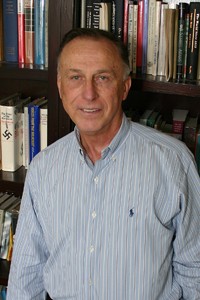
UC History Professor Goes on the Hunt for Hungarian Communist
Just as the FBI was on the hunt for him in the mid 20th century, J. Peters has also been the subject of a decade-long chase by University of Cincinnati
Professor Emeritus Thomas Sakmyster for his new book, Red Conspirator: J. Peters and the American Communist Underground.
Once considered a secondary character in U.S. communism, evidence uncovered by Sakmyster shows Peters was in fact an important actor in organizing the American communist party.
J. Peters was a communist who came to the U.S. and lived here for 25 years and never became a citizen, says Sakmyster. He became a very controversial figure. When the Cold War started in the late 40s, he was the focus of a lot of attention because he was accused of having headed one of the first Soviet espionage operations in Washington and of having run a false passport operation.
In the 1930s, Peters lucrative undercover passport business facilitated Soviet agents to travel to the U.S. and vice versa.
Further action is required to make this image accessible
One of the below criteria must be satisfied:
- Add image alt tag OR
- Mark image as decorative
The image will not display on the live site until the issue above is resolved.
Of course, at the time he denied everything.
Even after the FBI began following him, wire-tapping his phone, and renting out an adjacent apartment to further watch his every move, J. Peters was never charged with espionage.
But Sakmyster, a Hungarian expert who has written Hungary, the Great Powers, and the Danubian Crisis, 1936-1939 and Hungarys Admiral on Horseback: Miklós Horthy, 1918-1944, and received UCs George B. Rieveschl Jr. Award for Scholarly or Creative Works, recently found a memoir that gave him the tip-off that Peters had indeed taken part in a Washington spy ring.
Historians for a long time were not sure, Sakmyster says. But I stumbled upon an autobiography in the Hungarian archives, and while he was still denying everything years later, he kept leaving little hints and clues, such as being sent to Moscow to train in illegal work then going to the U.S. to put that training to use.
To me it was obvious what he was saying. It was as if he was boasting to his fellow communists that he did all these things but didnt get caught.
I concluded that the accusations against him were almost entirely true. He did run a false passport operation and put together thousands of false passports for communists. His successful spy ring in Washington included such controversial figures as Whittaker Chambers and Alger Hiss.
Peters was ultimately deported in 1949, but it took years for the FBI to understand that J. Peters was just one of the many aliases he used during his time in America.
The Hungarian man of mystery gave Sakmyster a run for his money as well. Not only did he have to dig up information from old FBI files, Hungarian and Russian archives and first-person interviews with people that knew Peters, Sakmyster obtained a U.S. microfilm collection about the American communist party that now sits in the UC libraryone of only four libraries in the country with the material.
He was so secretivehe didnt put things in writing but in code. The whole thing was a big puzzle for me to put together, Sakmyster says. I really was chasing him through time.
Red Conspirator: J. Peters and the American Communist Underground was published by the
and is available on
.
Related Stories
UC’s spring Visiting Writers Series promises robust, diverse...
December 20, 2024
Lovers of literature, poetry and the written word can look forward to a rich series of visiting writer presentations, offered through UC’s College of Arts and Sciences department of English, coming this spring.
Should voters have more say in Ohio's Legislature?
December 19, 2024
UC Professor David Niven talks to WVXU about gerrymandering in Ohio.
How tadpoles make the leap to frogs
December 18, 2024
In his biology lab, UC Professor Daniel Buchholz and his students are using a National Science Foundation grant to study the hormones that trigger metamorphosis in frogs.
